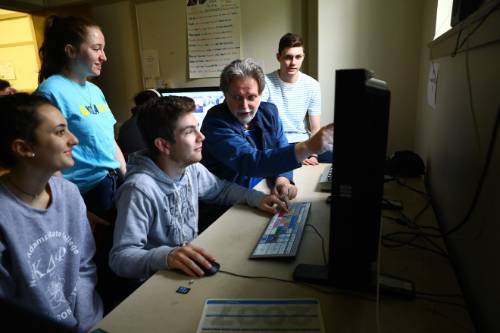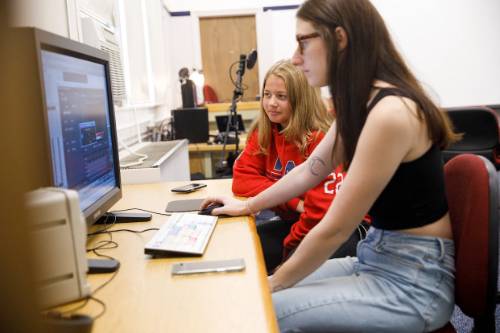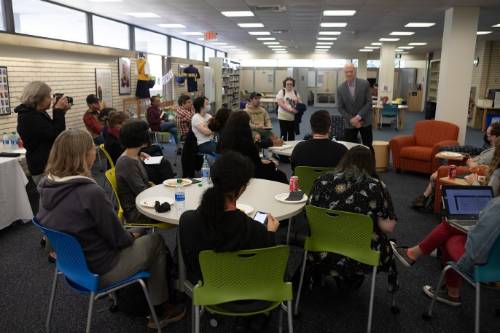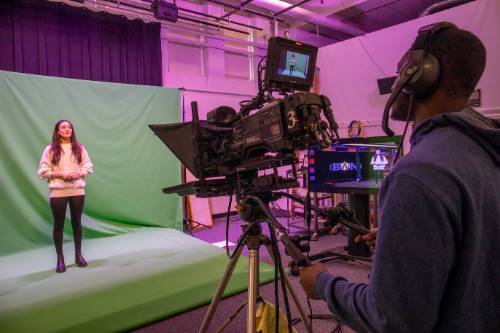
Our major emphasizes hands-on experience that you can gain in a wide variety of academic and professional settings including the college radio station (WJJW), the television and video studio (Beacon Web News (BWN)) and AVID editing suite, a digital production lab for film studies, the award-winning student newspaper (The Beacon), and our student literary magazine (Spires).
 A bachelor’s of arts in Communications combines hands-on skills in digital media production
with the kinds of information literacy skills that are needed to adapt to the ever-changing
communication environment of the 21st century. You will learn how to tell powerful
stories across media and how to best communicate to and engage with audiences. You
are encouraged to explore and develop your storytelling skills, whether through writing,
digital media production, television, radio, journalism, public relations.
A bachelor’s of arts in Communications combines hands-on skills in digital media production
with the kinds of information literacy skills that are needed to adapt to the ever-changing
communication environment of the 21st century. You will learn how to tell powerful
stories across media and how to best communicate to and engage with audiences. You
are encouraged to explore and develop your storytelling skills, whether through writing,
digital media production, television, radio, journalism, public relations.
![]() Our program is unique in that it allows students to experience the best of what both
the Communications fields and English fields have to offer. In classes and a number
of student media outlets you will interact with your peers pursuing English degrees.
Your B.A. in Communications within the English & Communications department will let
you be a generalist with extensive humanistic knowledge, capable of adapting your
skills and talents to the demands of a number of different career paths.
Our program is unique in that it allows students to experience the best of what both
the Communications fields and English fields have to offer. In classes and a number
of student media outlets you will interact with your peers pursuing English degrees.
Your B.A. in Communications within the English & Communications department will let
you be a generalist with extensive humanistic knowledge, capable of adapting your
skills and talents to the demands of a number of different career paths.
Your courses in the major fall into three broad areas: foundation courses that everyone in the major takes, concentration courses that focus on your particular professional or academic interests, and electives that expand your knowledge on specific topics.
![]() All majors take the following eight courses.
All majors take the following eight courses.
 Media Practice in Context
Media Practice in Context Media & Culture
Media & CultureTOTAL FOUNDATION COURSES 24 cr
Beyond the foundation courses shared by everyone, you select a concentration. Discuss with your adviser which concentration best meets your interests, talents, and career goals. Many students get the most out of their education and best position themselves for career success by choosing one or more concentrations or minors.
 Finally, you complete your major with additional courses that broaden your preparation.
Working closely with your adviser, you choose the electives that enrich your qualifications
for such career paths as digital media, journalism, media design, public relations
(corporate and not-for-profit), advertising, radio or television production, technical
writing, consumer relations, editing, politics, law, teaching, insurance, real estate,
and many more.
Finally, you complete your major with additional courses that broaden your preparation.
Working closely with your adviser, you choose the electives that enrich your qualifications
for such career paths as digital media, journalism, media design, public relations
(corporate and not-for-profit), advertising, radio or television production, technical
writing, consumer relations, editing, politics, law, teaching, insurance, real estate,
and many more.
For example, if you have a concentration in Digital Media Innovation, you might choose:
Your choice of electives should follow a coherent plan, reflecting your career goals, and broadening your exposure to the field.
Read the Anti-Racist Pledge from the English & Communications faculty
The Beacon is the weekly student newspaper of Massachusetts College of Liberal Arts.
Beacon Web News (BWN) is the weekly student news broadcast of Massachusetts College of Liberal Arts.
Spires is MCLA's student-run Literary Arts Magazine. In addition to our online platform, students publish a high quality print issue of the journal every spring semester.
WJJW (91.1 FM) is the radio station for Massachusetts College of Liberal Arts. We feature a wide variety of programming, 7 days a week, from hip-hop, comedy, vaporwave, folk, metal, and more!
Mei Craig '22 and Isabel Costa '21 spent the summer reporting on the Berkshires with the Greylock Glass, covering everything from local businesses to performing arts to agriculture.
On her way to achieve her goal of a career in television broadcasting, Shadea Blyther ’16 headed to New York City, N.Y., where she works as a writer and an editor for Bronze Magazine. “I feel like this is the start. I am happy where I am for now, and will keep moving forward.”
As part of Dr. Rosanne Denhard’s “Arts of Medieval & Renaissance Britain” class, students explored landmark sites, visited art galleries and museums, and took in theatrical productions. “England was overall just an amazing experience,” said Michael Masley Hannett ’19. “I learned about another culture far more than I could have in a textbook or from a website.”